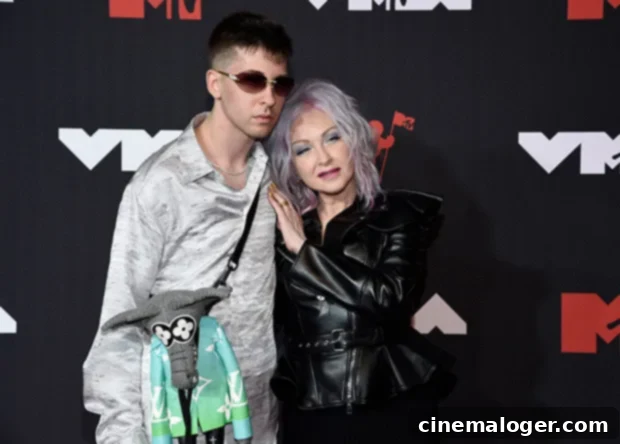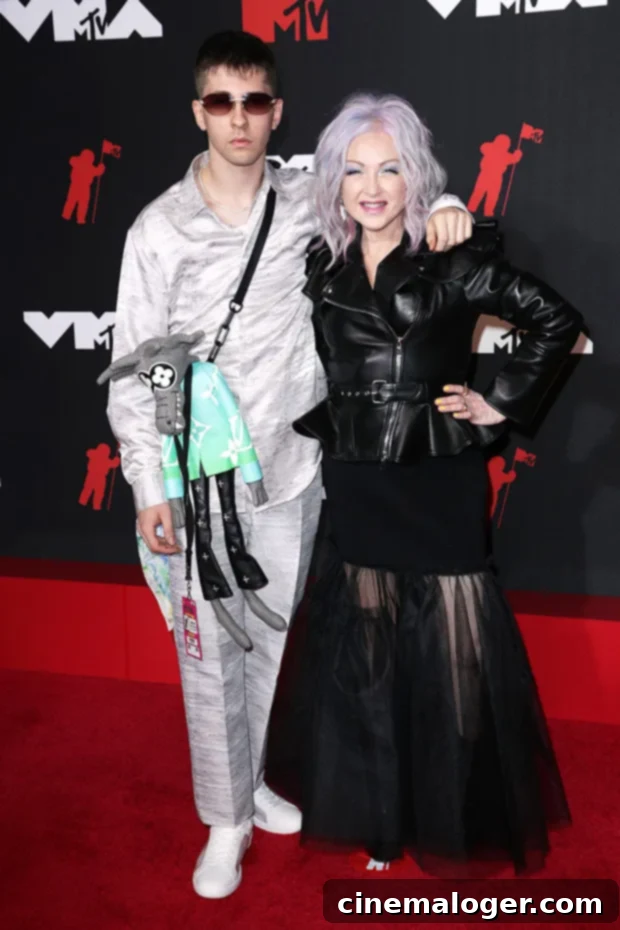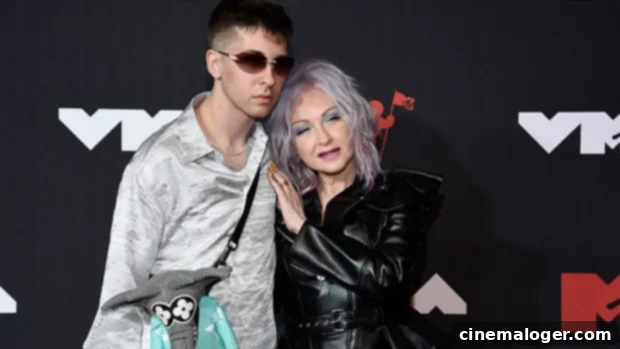Cyndi Lauper’s Powerful VMA Return: Pop Icon and Son Declyn Advocate for Women’s Rights and Celebrate a Legacy
On September 12, 2021, the music world gathered to celebrate the MTV Video Music Awards, marking the iconic network’s 40th birthday. Among the many luminaries gracing the event, legendary pop icon Cyndi Lauper made a memorable appearance that blended personal pride with a powerful public statement. Before captivating the audience with her timeless advocacy on stage, Lauper, known globally for her vibrant music and distinctive style, shared a heartwarming red carpet moment with her equally stylish son, Declyn, 23, creating a visual testament to her enduring influence across generations. Her presence at the MTV Video Music Awards wasn’t just a nod to her storied past with the network, but a vibrant reaffirmation of her contemporary relevance and unwavering commitment to social justice.
A Red Carpet Moment with Son Declyn Lauper
The red carpet at the Barclays Center in Brooklyn, New York, buzzed with excitement as Cyndi Lauper arrived, her distinctive aura immediately drawing attention. She was not alone, but accompanied by her handsome son, Declyn Wallace Thornton Lauper, making their joint appearance a highlight of the pre-show festivities. This public display of familial affection added a personal touch to the high-profile event, showcasing the strong bond between mother and son. Cyndi, ever the fashion trailblazer, opted for a striking ensemble: a sleek black leather jacket layered over a sheer, elegantly draped dress, perfectly balancing edgy rock-and-roll chic with sophisticated glamour. Her outfit choices consistently reflect her personality—bold, authentic, and unafraid to make a statement. Declyn complemented his mother’s iconic style with his own contemporary flair, sporting a coordinated grey shirt and pants combination. His look was further enhanced by a pair of cool sunglasses, adding an air of effortless cool that resonated with the youthful energy of the VMAs. The mother-son duo presented a picture of harmony and shared style, looking undeniably cute and cohesive as they posed for photographers, creating a memorable red carpet moment that captured the attention of fans and media alike.

Cyndi Lauper’s Enduring Legacy and VMA History
Cyndi Lauper’s connection to the MTV Video Music Awards runs deep, stretching back to the very first ceremony. As she later reminded the audience, she was a recipient of a coveted “moon person” trophy at the inaugural VMAs in 1984. This historical link underscores her foundational role in the network’s rise and the visual culture of music. Her groundbreaking videos for hits like “Girls Just Want to Have Fun,” “Time After Time,” and “She Bop” were instrumental in defining the early aesthetic of MTV, showcasing her vibrant personality and innovative storytelling. These videos weren’t merely promotional tools; they were mini-films that pushed creative boundaries and celebrated individuality, resonating profoundly with a generation. Her early nominations and wins solidified her status as a pop music powerhouse, not just for her vocal prowess but for her distinctive visual artistry. Returning to the VMAs, especially for its 40th anniversary, served as a powerful reminder of her enduring impact on pop culture and her consistent ability to remain relevant across decades. Her presence bridged the gap between MTV’s formative years and its contemporary landscape, proving that true artistry and authentic voice transcend fleeting trends.
A Powerful Platform: Advocating for Women’s Rights on Stage
The night’s most poignant moment arrived when Cyndi Lauper took the stage, transforming her presentation into a powerful platform for social commentary. With her characteristic blend of warmth and defiance, she greeted the audience, reminiscing about her early VMA success: “How are you doing? I won a moon person at the very first VMAs in 1984. Things are a little different now.” This opening line immediately set a contemplative tone, acknowledging the passage of time and the shifting social landscape. She then pivoted to deliver a message that resonated deeply, speaking directly to the ongoing struggles for gender equality: “Yeah, girls wanna have fun. But we also want to have funds. Equal pay. Control over our bodies! You know, fundamental rights.” This impassioned declaration, delivered with conviction, succinctly captured the core demands of modern feminism. By connecting her iconic anthem “Girls Just Want to Have Fun” with the urgent need for economic and bodily autonomy, Lauper brilliantly highlighted how the desires for joy and freedom are intrinsically linked to fundamental human rights. Her words served as a powerful reminder that while much has changed since 1984, the fight for true equality, encompassing fair wages, reproductive freedom, and basic human dignity, remains as critical as ever.

From “Girls Just Want to Have Fun” to Fundamental Rights
Lauper’s speech was particularly impactful because it elegantly wove together her personal history as an artist advocating for self-expression with the broader, collective struggle for women’s rights. The phrase “girls wanna have fun” immediately evokes her timeless 1983 hit, a song that became an anthem for female empowerment and liberation. However, her addition of “But we also want to have funds. Equal pay. Control over our bodies! You know, fundamental rights” underscored a crucial evolution in the discourse. It highlighted that true fun and freedom are often unattainable without economic independence and bodily autonomy. “Funds” and “equal pay” address the systemic economic disparities that disproportionately affect women globally, limiting their opportunities and choices. “Control over our bodies” is a direct assertion of reproductive rights and personal sovereignty, a constant battleground in the fight for gender equality. By articulating these demands on a global stage like the VMAs, Lauper ensured that these critical issues reached millions, reminding everyone that the pursuit of joy and individuality must be underpinned by concrete, enforceable rights. Her advocacy was not just a passing comment but a continuation of a career-long commitment to speaking truth to power and championing the marginalized.
Presenting the Best Pop Award
Following her powerful declaration, Cyndi Lauper proceeded with her official duty for the evening: presenting the highly anticipated Best Pop award. This category, always a highlight, celebrates the artists who have dominated the charts and captured the public’s imagination with their infectious melodies and relatable lyrics. Cyndi Lauper, a pioneer in the pop genre herself, was a fitting choice to present this honor. The award ultimately went to an acclaimed trio: Justin Bieber, Daniel Caesar, and Giveon, for their collaborative hit, “Peaches.” The song, a smooth R&B-infused pop track, had enjoyed immense commercial success and critical acclaim, becoming one of the most streamed and beloved songs of the year. Lauper’s presentation not only celebrated contemporary pop artistry but also served as a symbolic passing of the torch from a legendary figure to the current generation of hitmakers, further cementing her role as an enduring and respected voice in the music industry.
Cyndi Lauper’s Unwavering Commitment to Equality
After stepping off the VMA stage, Cyndi Lauper continued to elaborate on her unwavering dedication to women’s rights in an exclusive interview with Entertainment Tonight. She emphasized that her advocacy was not a new stance but a deeply ingrained part of her identity and career trajectory. She meticulously explained her long-standing efforts to ensure that her seminal music video for “Girls Just Want to Have Fun” would genuinely represent “all girls.” Lauper expressed, “I worked really hard to get ‘Girls Just Want to Have Fun’ to represent all girls, so that all girls could see themselves.” This profound statement reveals the conscious effort she put into crafting a message of inclusive empowerment, striving for a visual narrative that transcended demographic boundaries and embraced the diversity of female experience. She wanted the video to be a mirror, reflecting the dreams and desires of every young woman, regardless of their background, race, or socio-economic status. This commitment transformed a catchy pop song into a cultural phenomenon, a beacon of joy and solidarity for women worldwide.
Lauper further reflected on the challenges she faced early in her career, drawing a parallel between her personal struggles and the broader fight for women’s voices to be heard and valued. She recalled her experience at the initial VMAs, stating, “I wanted to capture that, and I’ve got to say, we were the little engine that could. I was up for seven awards that year, didn’t win one. [But] I was there, and I got to make this performance art.” This candid admission of being recognized but not awarded, yet still making a significant impact, speaks volumes about her resilience and artistic integrity. It highlights that success for her wasn’t solely defined by trophies but by the ability to create meaningful art and inspire change. Her journey, marked by perseverance and a refusal to be silenced, mirrors the broader fight for women’s rights—a continuous effort to make space, demand recognition, and ensure that every woman has the opportunity to shine, to have fun, to have funds, and to control her own destiny. Cyndi Lauper’s VMA appearance was a powerful synthesis of her iconic past and her vital present, proving that her voice remains as relevant and resonant as ever in the ongoing pursuit of equality.
